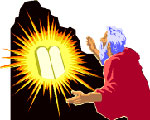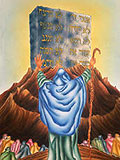May:Shavuot(五旬节)
(单词翻译:单击)
| the 5th day of Sivan , fifty days after Passover (Jewish world) |
 The Yom Tov begins at sundown of the 5th day of Sivan (息汪月, 即犹太教历3月,犹太国历9月,在公历5、6月间,共30天), exactly fifty days after Passover (犹太教的逾越节). The Yom Tov begins at sundown of the 5th day of Sivan (息汪月, 即犹太教历3月,犹太国历9月,在公历5、6月间,共30天), exactly fifty days after Passover (犹太教的逾越节).
Shavuot, the Feast of the Weeks, is the Jewish holiday celebrating the harvest season in Israel. Shavuot, which means "weeks", refers to the timing1 of the festival which is held exactly 7 weeks after Passover. Shavuot is known also as Yom Habikkurim, or "the Day of the First Fruits", because it is the time the farmers of Israel would bring their first harvest to Jerusalem as a token of thanksgiving. Shavuot also commemorates2 the anniversary of the giving of the Ten Commandments to Moses (十诫, 犹太教、基督教的诫条) and the Israelites at Mount Sinai (西奈山,基督教《圣经》中记载的上帝授予摩西十诫之处).
Another Shavuot custom is the eating of dairy foods. One explanation states that this comes from a passage in the Torah which reads: "And He gave us this land, a land flowing with milk and honey".
Another legend tells the story of the Israelites finding Mount Sinai blooming and lush with greenery and flowers. From this legend grew the custom to decorate the Jewish home and synagogue with tree branches and flowers. Some temples decorate the Torah scrolls6 with wreaths of roses. |
 收听单词发音
收听单词发音
1
timing

|
|
| n.时间安排,时间选择 | |
参考例句: |
|
|
|
2
commemorates

|
|
| n.纪念,庆祝( commemorate的名词复数 )v.纪念,庆祝( commemorate的第三人称单数 ) | |
参考例句: |
|
|
|
3
compensate

|
|
| vt.补偿,赔偿;酬报 vi.弥补;补偿;抵消 | |
参考例句: |
|
|
|
4
negligence

|
|
| n.疏忽,玩忽,粗心大意 | |
参考例句: |
|
|
|
5
utensils

|
|
| 器具,用具,器皿( utensil的名词复数 ); 器物 | |
参考例句: |
|
|
|
6
scrolls

|
|
| n.(常用于录写正式文件的)纸卷( scroll的名词复数 );卷轴;涡卷形(装饰);卷形花纹v.(电脑屏幕上)从上到下移动(资料等),卷页( scroll的第三人称单数 );(似卷轴般)卷起;(像展开卷轴般地)将文字显示于屏幕 | |
参考例句: |
|
|
|

 Many of the traditions and customs of Shavuot have evolved from the legends and stories describing the experiences of the Israelites at Mount Sinai. According to tradition the Israelites actually overslept on the morning of God's visit. To
Many of the traditions and customs of Shavuot have evolved from the legends and stories describing the experiences of the Israelites at Mount Sinai. According to tradition the Israelites actually overslept on the morning of God's visit. To  Another explanation comes from a legend stating that before the visit from God the Jews did not keep kosher (指食物、饮食店等合礼的,符合犹太教规戒律的) or follow the Kashrut (dietary) laws. It was on this first Shavuot that they found out that their
Another explanation comes from a legend stating that before the visit from God the Jews did not keep kosher (指食物、饮食店等合礼的,符合犹太教规戒律的) or follow the Kashrut (dietary) laws. It was on this first Shavuot that they found out that their 


